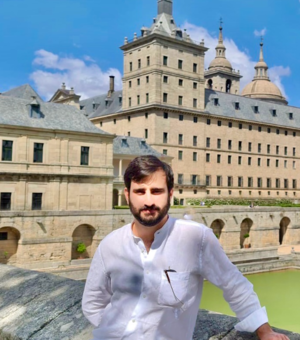Eduardo Benítez-Inglott y Ballesteros
Thesis Title: In an Age of Uncertainty: Inquisition in Castile and Aragón (1425–1504)
Supervisors: Professor Steven Gunn and Dr John Edwards (†)
Eduardo's doctoral project explores the genesis of the Spanish Inquisition between the first known inquisitorial 'initiative' in Castile (1425) and the death of Queen Isabel la Católica (1504). By focusing on the development of regional understandings of heresy, he investigates the relationship between pastoral visitation for the detection of heresy before 1478, and also examines the post-1478 Holy Office's impact on local political structures under the Catholic Monarchs. Eduardo is also researching movements for and against the Inquisition in Renaissance Rome using the discipline of Applied Diplomatics, which studies documentary structures and settings to solve substantive historical problems. His work examines how the Inquisition, especially in its early years, profoundly influenced the production, dissemination, and control of written texts. By analysing the creation and circulation of legal, theological, and inquisitorial documents, Eduardo explores how these texts became tools for both enforcing orthodoxy and negotiating power, shaping the intellectual and political landscape of the time. His research has also brought to light the different ways in which the Papal Tribunal of the Apostolic Penitentiary handled petitions for absolution from those persecuted and condemned by the Spanish Inquisition, thus pioneering a previously unexplored aspect of inquisition history.
Research Interests and Teaching
Eduardo is an interdisciplinary student with interests ranging from anthropology to manuscript studies and covering politics, administration, religion, art, and literary studies.
Over Michælmas 2022 he acted as graduate assistant in the special subject paper The Trial of the Tudor State: Politics, Religion, and Society, 1540-1560 at Lincoln College. He has tutored at Merton College the optional subject paper Conquest and Colonisation: Spain and America in the Sixteenth Century. He is currently tutor Christ Church for BIF3 and EWH5.
Select conference papers
- 'Seville's Inquisition Network, c. 1474-c. 1504', paper presented in the panel 'Converso Entanglements in 15th-century Castile', International Medieval Congress 2023: Networks & Entanglements, University of Leeds (4 July 2023).
- 'A revolving door? heresy and apostasy in the context of forced conversion in Spain (1391-c.1450)', paper presented in a two-part special workshop on conversos, Universidad de Buenos Aires-Queen Mary University of London-University of Oxford (20 & 27 May 2022).
- 'El chivo expiatorio en la Castilla e Inglaterra tardomedieval: Los Lolardos y los Judeoconversos', Aula Manuel Alemán, Universidad de Las Palmas de Gran Canaria (14 January 2021).
- 'Discordia in regno, hæreses ubique: disobedience, socio-political tensions, and the “creation” of heresy', L'Apprendistato dello storico (IV): disobbedire nel medioevo. Tensioni, repressioni, pacificazioni, Sapienza Università di Roma (11-15 January 2021).
- 'The Politics of Heresy: the Scapegoating of Minorities in Fifteenth-century England and Castile', The Oxford Transnational and Global History Seminar, University of Oxford (24 November 2020).
Publications
- 'Causas in Partibus Cognoscendas: An Edition of a Vatican Document and Its Possibilities for Future Research on Papal Judges Delegate in Late Medieval Castile', Anthologica Annua, 70/1 (2023), 349–68. Available online.
Public Engagement
Eduardo is committed to sharing his project and discoveries with those beyond the academic environment. To that intent he is involved with the media and can be found on Academia.edu, LinkedIn, and is very happy to be contacted by e-mail.
- Contribution with Dr Jörn Günther Rare Books AG: 'Popes, Conversos, and the Eternal City' (15/09/2023).
- Interviewed in the podcast series Triálogos (13/02/2021): 'The Inquisition and the 21st Century: History in the Service of the Present'. Available via YouTube and IVOOX.
- Interview: 'Un Canario en Oxford' ('A Canarian at Oxford'), Canarias7 (29/12/2019).
About
Eduardo read History at King's College London as an undergraduate (2014–2017). He then pursued an MSt Medieval Studies at St Catz, Oxford (2017-2018). He has been in receipt of numerous awards, including the Vice-Chancellor's De Osma Studentship and the Jewish Historical Society of England's Award.
He is an member of the Jewish Historical Society of England, the British-Spanish Society, the British School at Rome, and the Oxford Centre for Intellectual History.




